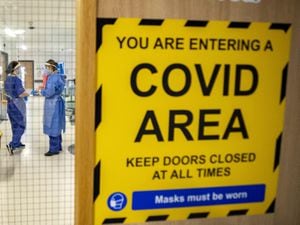Calls for inquiry as figures confirm huge rise in deaths across region
Covid leaves its devastating mark on death figures.

The Black Country and Staffordshire saw big increases in recorded deaths last year compared to the average for the previous five years, analysis of figures show.
Health charity The King's Fund described last year's death toll across England and Wales as "extraordinary" and is calling for a public inquiry to look at the Government's handling of the pandemic.
Office for National Statistics data shows 3,656 deaths were registered in Sandwell last year – 23 per cent more than the annual average of 2,974 between 2015 and 2019.
A total of 1,579 deaths were registered in Stafford last year – 21 per cent more than the annual average of 1,308 between 2015 and 2019.
In Wolverhampton there was a 19 per cent increase – from the annual average of 2,638 between 2015 and 2019, to 3,152 in 2020.
The data shows there was also a 19 per cent increase in South Staffordshire – with 1,431 deaths in 2020, compared to the annual average of 1,202 between 2015 and 2019.
More Covid-19 coverage:
While in Dudley, there was an 18 per cent rise – with 3,784 deaths were registered in 2020, compared to the annual average of 3,207 between 2015 and 2019.
In Walsall, 3,187 deaths were registered last year – 16 per cent more than the annual average of 2,739 between 2015 and 2019.
And 1,060 deaths were registered in Cannock Chase in 2020 – a rise of 12 per cent on the annual average of 943 between 2015 and 2019.
They were among the 64,700 recorded across the West Midlands, which was around 9,800 higher than the preceding five-year average.
Health experts have repeatedly said “excess deaths” are a better measure of the overall impact of the coronavirus pandemic than simply looking at mortality directly linked to Covid-19. This is because they capture deaths that may have been indirectly caused by the crisis, either due to people finding it harder to access medical care for other conditions, or avoiding help altogether.
Across England and Wales, 608,000 deaths were registered last year – 76,000 higher than the average for 2015 to 2019.
Veena Raleigh, senior fellow at The King’s Fund, said the ONS figures represented a “extraordinary death toll”.
“Of course, the pandemic is not over yet and there are still more deaths to come,” she said.
“At some stage, we hope there will be a public inquiry that will look at mistakes that could have been avoided.
“The UK went into this pandemic having had a long period of austerity, which meant the NHS was already overstretched.
“The NHS has done an admirable job dealing with this virus. Their job was made harder by mistakes and delays in the Government’s handling of the pandemic.”
A Department of Health and Social Care spokeswoman said: “Every death is a tragedy and our deepest sympathies go to the families and loved ones of those who have died.
“Throughout the global pandemic the NHS has remained open for urgent care and we continue to urge anyone who needs healthcare to come forward.”





